#bertram bennet
Explore tagged Tumblr posts
Text
The Tilney Family Album: Volume XV
More Tilneys today.

Domestic bliss with Esther and Eleanor.

If only Eleanor would put her logic toy down for a moment, Esther has something very important to ask her.

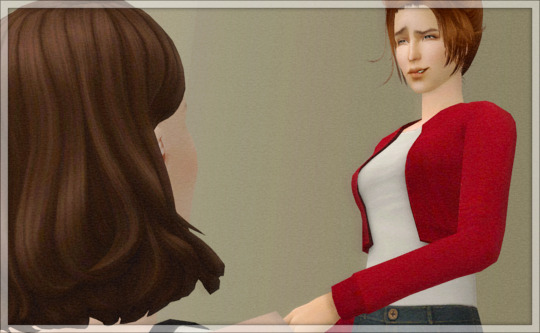
This isn't really going quite how Esther envisaged...


but she ploughs on gamely.

It's all too much too soon for Eleanor...
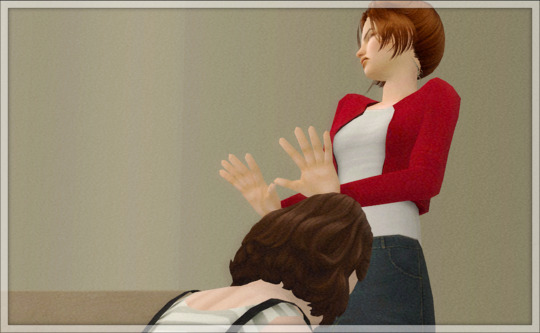
and she has to refuse.

She does love Esther, but thinks it's far too soon to be making a long-term commitment to each other.

Anyway, right now, there's a party to concentrate on!

Cousins and best mates Bertram and Bennet find a quiet spot to chill out and catch up.
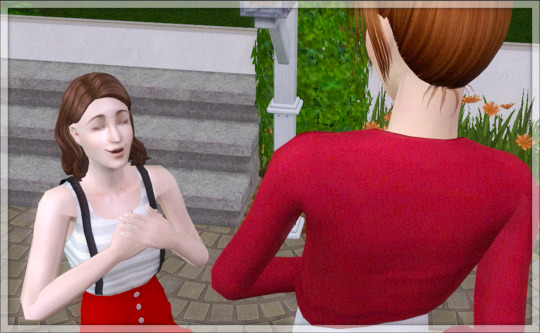

Esther figures that maybe Eleanor just needed to sleep on it.
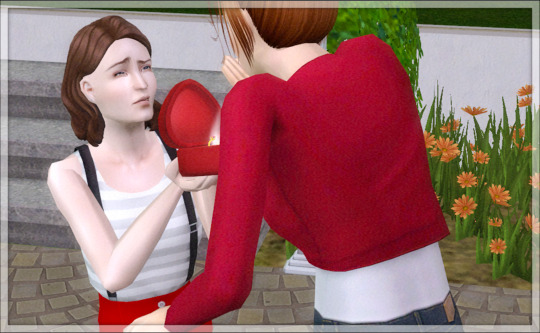
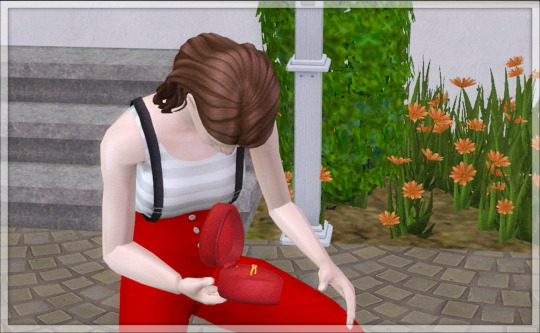
But no, Eleanor really knows her own mind on this.

Besides, Eleanor is too distracted by saying a final farewell to Max to think about anything else right now. (Sorry for the lousy picture, but I was taken completely by surprise - much like Joanna!)

Esther is sure she knows the way to her girlfriend's heart, and presents Eleanor with a gift that she has been absolutely longing for. They don't have much money to spare, but it was worth every penny, to see the delight on her beloved’s face.


And - just maybe - her thoughtfulness will make Eleanor realise that they're really meant to be together, forever.

Eh, no.

But despite their strained relationship, Eleanor really is delighted with the top-notch telescope that Esther gave her. (Today's instalment was brought to you by @lazyduchess's Autonomous Engagement mod.)
#sims 2#gameplay#merybury#eleanor tilney#esther dashwood#max tilney#bertram bennet#bennet tilney#joanna brandon#tilney family#dashwood family
20 notes
·
View notes
Note
Could you rank the Austen main couples from the least to the most likely to have sex before they are married?
Least to Most Likely:
Edmund Bertram & Fanny Price: It is all very proper. They probably have sex with their clothes on after the wedding.
Fitzwilliam Darcy & Elizabeth Bennet: She would have been down, he wasn't. He later congratulates himself on his excellent self control.
Edward Ferrars & Elinor Dashwood: There were definitely smooches, but after that roller coaster of a courtship, Elinor wants things legal and in writing. Also, just because something feels good doesn't make it right, MARIANNE.
Henry Tilney & Catherine Morland: he is a gentleman, but it was really the long distance relationship that prevented them from doing anything. Was there some racy content in those letters? I'd love to know...
George Knightley & Emma Woodhouse: Donwell is right there. You can walk right over...
Charles Bingley & Jane Bennet: "Bingley, who wanted to be alone with Jane" I see your intentions, sir. I see them!
Colonel Brandon & Marianne Dashwood: "I have feelings," said she, "let's indulge them." If something feels good, that makes it moral, right? Romanticism says yes, ELINOR.
Captain Frederick Wentworth & Anne Elliot: Do not care about anything except getting married as quickly as possible. Banns take far too long when you've been waiting 8 years and Napoleon just escaped from Elba. Let's get this DONE.
BONUS:
Lucy Steele & Robert/Edward Ferrars: No way in hell with either of them. She's too cunning to give up her best card before she has the man secure.
Frank Chuchill & Jane Fairfax: Not in a million years, no matter how many times Frank makes puppy eyes.
Robert Martin & Harriet Smith: Abbey Mill farm is like, right there. You can walk over. It has a hay barn...
Related: First Kiss for each Austen Heroine Couple
Also, marriage and birth records show that premarital sex was pretty common. Or else the Regency era had magically good premature baby care 😉
#jane austen#question response#anticipating their vows#austen main couples#am I going to tag them all or be lazy?#edmund bertram#fanny price#elizabeth bennet#fitzwilliam darcy#jane bennet#charles bingley#emma woodhouse#george knightley#captain wentworth#anne elliot#elinor dashwood#marianne dashwood#colonel brandon#henry tilney#catherine morland
527 notes
·
View notes
Text
My only problem with Fanny is how she treats Mary Crawford as if she is the most vile, terrible, immoral crature of all time. There is this one snarky comment she makes about her uncle being adulterous (can't remember exactly what it was) that Fanny makes such a big deal about it that made me think "Damn, I've said meaner stuff and had people forgive me more easily".
She definetly have her flaws, but she does get better the more time she spends with Edmund and Fanny.
I think Mary is kinda similar to Kitty Bennet, maybe a mix between Lizzie and Kitty, the narrator was just way too harsh on her.
Also, (credits to my cousin for finding this paralel) Edmund backing up on the engagement because of Henry Crawford is the opposite of Darcy doing everything to the Bennet family after the Lydia and Wickham situation and marring Lizzie despite the whole thing. Even the narrator says that Edmund was already set to proposing to Mary before Henry ran away with Maria.
Idk, man, I want to hear other people's opinions, but I just really pitty Mary Crawford. Fanny, the narrator, Jane Austen, everyone is just way too harsh on her. She's not that terrible and could have had a happier ending in a more forgiving book.
I'm sorry, but if you call Fanny Price (or any female character) insipid, I don't want to hear anything else you have to say.
#manfield park#jane austen#mary crawford#fanny price#edmund bertram#lizzie bennet#mr darcy#lydia bennet#pride and prejudice#paralells
54 notes
·
View notes
Text
I asked you which Jane Austen character would be the best at assembling IKEA furniture, so now I must know...
Don't you dare yell at me for not including XYZ Character—do you know how impossible it is to pick only 11 Austen characters who suck at assembling IKEA furniture? There are way too many of them! So so many Austen characters would be destroyed even by a Lack table!
Reblog and share in the tags how the IKEA disaster goes down for the character you picked.
#this might be the hardest poll i've ever made#they would all be so bad at this for so many different reasons#dick musgrove is kind of cheating because he's not actually a living character that appears on page#but i couldn't resist adding him#and it's my blog so i can do what i want#ikea#jane austen characters#jane austen crack#jane austen#polls
126 notes
·
View notes
Text
People love dichotomies.
One of the dichotomies people love inserting into Jane Austen is “marrying for love” vs “marrying for money.”
We have a chicken or egg question here about if people read this into the text so much because so many adaptations add dialogue that lays it out, or if so many adaptations add dialogue that lays out such a conflict because people love to read it into the text.
But if you read the books themselves, it just isn’t there. (This is why the occasionally bandied criticism that Austen “gets out” of having to make a choice by having her heroines “conveniently” fall in love with men who have enough money to marry on is irrelevant - that’s not what’s going on).
Instead, across her works, Austen presents marrying for love and marrying for money not as a dichotomy, but as opposite ends of a spectrum in which the rare extreme ends are each foolish and almost everyone negotiates their way through the space in the middle.
You see, to make a “good” marriage in the Austen-verse, you need a trifecta. And you do need all three - if you try to justify skipping one by maxing out one of the others, things will not end well for you.
The three things you need for a good marriage are these:
Personal compatibility and mutual respect
Financial stability within your social class
Positive feelings towards each other
You do not need love! Love is just a max-out on positive feelings, and while all her heroines find romantic love in marriage in the end (these are love stories), it’s not portrayed as necessary - Marianne Dashwood marries out of respect and gratitude and falls in love afterwards, and we don’t know about most of the minor characters, but there’s no reason to suppose that all minor character happy marriages we see are love matches. The Gardiners, for instance, could have married on simple fondness and the mutual desire to form a household, and they seem perfectly happy.
You do not need wealth! Wealth is just a max-out of financial stability. Plenty of heroines (Elinor Dashwood, Catherine Morland, even Fanny Price and Anne Elliot) marry men with respectable incomes but no land-holdings or vast riches.
I can’t think of an example for the third piece - if there is a couple in Jane Austen who are maxed out on mutual respect and compatibility, it’s the Crofts, and they also like each other and have enough to live on.
But if you’re missing one leg of the three-legged stool, you are in trouble!
Fanny Price’s parents married for love, but had no money - and they both seem pretty miserable when we see them again.
Maria Bertram marries for wealth alone, with no affection or respect for her husband - and it makes her life a train wreck.
The Bennet parents seem to have been a love match (why else would he marry a woman of no family who used to be a great beauty) and he has enough to live on whether she brings in a dowry or not. But they are not compatible and don’t respect each other, so their marriage is still kind of a disaster.
The closest example we have of someone seeming to get along ok without all three is Charlotte Lucas, who marries for financial independence, and while she’s more compatible with Mr Collins than she seems at first blush (they’re both unembarrassed to suck up to Lady Catherine), she has no positive feelings towards her husband, but still seems to be alright with her choice. And yet even there, the narrator warns that she may not always have as few regrets as she does now.
Any time you try to look at the various matrimonial decisions made by Jane Austen characters through a lens of love vs finances instead of considering whether and to what extent a marriage might check all three boxes, you’re doing it wrong.
#jane austen#pride and prejudice#sense and sensibility#mansfield park#persuasion#northanger abbey#emma
70 notes
·
View notes
Text
@bethanydelleman Here are my musings on the question I asked – I was thinking more in terms of which characters could like and respect each other and how well their personalities would mesh, more than their likelihood of necessarily falling deeply in love. Mr. Knightly does deeply respect and admire Jane Fairfax, though he isn’t in love with her, and many of the people I’ve shipped with him (Elinor, Fanny, Jane Bennet) have personalities similar to hers.
Who Else Could Austen Characters Marry?
If Austen characters didn’t marry their canon spouse, who else would they be good with?
Elinor Dashwood: I think she mostly values a man who has sense and principle, from what we see of Edward Ferrars, and who doesn’t stand too much on dignity. I think she could be happy with either Mr. Knightley or Edmund Bertram, and they could be happy with her.
Marianne Dashwood: I could see her and Wentworth falling for each other. They’re both passionate and romantic, and for most of the time between his breach with Anne and the midpoint of Persuasion Wentworth wants a woman who is firm and determined in her opinions, decisions, and loves, which is definitely Marianne! I think this would lead to both of them being somewhat less mature than they end up in canon – they’d reinforce each other’s impulsiveness and passion, and they might also have some trouble budgeting – but on the whole it would work. Marianne would have a lot of trouble keeping it together when he was away at sea, or might decide to go with him on his ship.
Jane Bennet: Jane’s kind and generous of spirit, I think she would like any warm, personable, and good man. Mr. Knightley is again a good choice.
Elizabeth Bennet: I could see her with either Mr. Knightley – she and Emma have the same liveliness and some of the same flaws of over-trust in their judgement, and I think he’d be good for her and they would be happy, as he has all Darcy’s good points without the haughtiness – or with Henry Tilney. In the case of Henry Tilney, I think that (like Wentworth and Marianne) they’d both end up less mature than they do in canon: Elizabeth and Henry would both reinforce each other’s satirical tendencies, rather than them being leavened by Catherine’s innocence in one case and Darcy’s stability in the other. But they would be happy, and make a good deal of sport of their neighbours.
Another possibility – I don’t know how well it would work out, but I could see it happening – is her and Henry Crawford. He’s intelligently, lively, active, with a lot of ideas, and I think that would appeal to her. She was initially drawn to Wickham, after all, and Crawford his his charm along with more intelligence. Would Henry Crawford fall for her or just leave her “crossed in love”? If the latter – she’s pretty resilient and I think she’d get over it. If the former, I’m not sure how it would turn out.
Fanny Price: I’m being repetitive, but I do want her with Mr Knighley, she deserves him and he would be kind to her and she’d be, honestly, a really good Lady Bountiful with the capacity for helping those around her that his estate gives, and with the support of a husband who is thoroughly and non-ostentatiously charitable himself. Mr. Knightley and Jane Fairfax is my fanon ship, but honestly this is even better.
Emma Woodhouse: This is more difficult, especially as I don’t think there’s anyone but Mr. Knightley who would be willing to move into her house with her father and be as patient with Mr. Woodhouse as Mr. Knightley is. But she’s also the Austen heroine I can see as the most happily single – she’s independently wealthy, and even when she realizes her feelinfs for Mr. Knightley it’s more about not being superceded and excluded from his confidence (“being first with Mr. Knightley”) as anything romantic. Her level of happiness would somewhat depend on who else Me. Knightley married – I feel like she and Elizabeth would get on like two cats.
Jane Fairfax: Bingley has Frank Churchill’s liveliness and friendliness amd is, I think, a better person; they could be happy. Caroline Bingley would be so mad about him marrying a governess, though, so that would give Jane a harder time.
Anne Elliot: It’s hard to tell with her. Would she ever love anyone but Wentworth? She turned down Charles Musgrove, who’s a good guy on the whole and personable, probably because she was still in love. She and Colonel Brandon, who are both older and have lost loves (and he’s a military man as well) might bond and make a match of it.
Catherine Morland: The main challenge here is how young she is (17) compared to most of the male leads. She could be happy with a lot of different people (Edward Ferrars? Bingley?).
I’m finding it more difficult to work out who else would be a good match for some of the men. For example, Darcy: there’s no one else with quite Elizabeth’s combination of liveliness, defiance, intelligence, and goodness, that would have the defiance and fire to deflate his pride and make him reconsider his attitude, the wit to make him take himself less seriously, and the boldness not to be intimidated by his haughty reserve. I do not think he and Fanny Price (a pairing I have seen suggested) would work at all – he might feel compassion towards her, but if Elizabeth’s family are embarassing, Fanny’s are not even genteel: he’d never lower himself so far as to marry her. And if he did, the girl who’s browbeaten by Mrs. Norris would be ready to sink into the floorboards at the contempt of Lady Catherine.
72 notes
·
View notes
Text
The Bennet Family Album: Volume IX

Ah, they're such a tight-knit little family!

OK, well, it's not always entirely harmonious between the brothers.
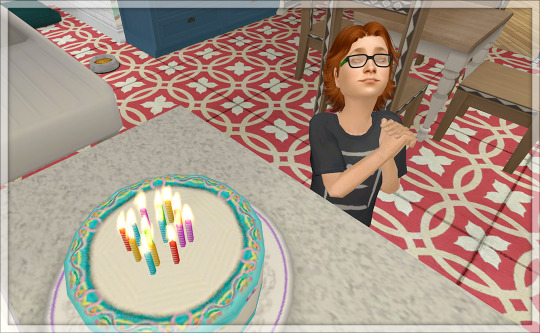
Anyway, it's time to put any sibling rivalry aside, as it's Brandon's 13th birthday! That looks like some wish he's making.

Time to blow out the candles!
"What, now?"
"Yes!"

"OK!"
~ Scorpio 7 / 10 / 10 / 7 / 9
~ Dog Person / Bookworm / Virtuoso / Social Butterfly
~ OTH: Music & Dance
~ Favourite Colour(s): Green
~ Aspiration: Popularity / Fortune
~ Turn-ons / -off: +Cultured / +Well-Liked / -Brown Hair
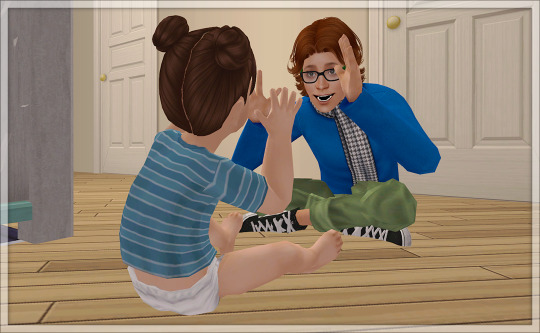
Although most of his extended family have gathered to celebrate his birthday with him, Brandon doesn't want little sister Elizabeth to feel left out, so he makes it a priority to give her some attention too. What a sweetie!




As soon as he gets a chance, he heads straight out to the garage to try out his birthday present. Maybe his brother Giles was right - perhaps piano isn't his instrument after all!
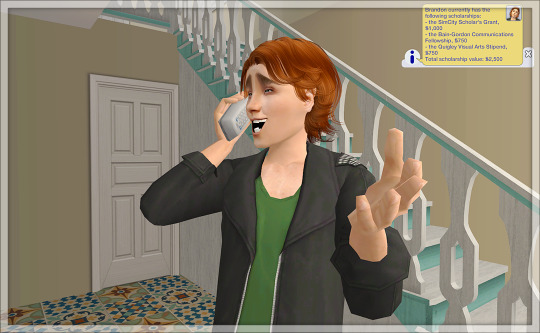
I hadn't realised what a high achiever he is all round - I think he has a bright future ahead of him! (I also realised that he actually has Beth's eyes, not Bertram's, so he's 'grown out' of his glasses now - I have a rule that any child who shares the eye shape of a parent that wears glasses, will also wear glasses themselves.)

Elizabeth's birthday shortly after is a much quieter affair.
~ Cancer 10 / 9 / 9 / 10 / 7
~ Coward / Dog Person / Good Sense of Humour
~ OTH: Fitness
~ Favourite Colour(s): Orange

She celebrates her birthday by defrizzing her hair, getting a new pair of glasses, and making a start on exercising her Dog Person powers on Midge.
#sims 2#gameplay#merybury#bertram bennet#beth brandon#brandon bennet#giles bennet#elizabeth bennet#midge bennet#bennet family
11 notes
·
View notes
Text
Many of the Gothic novels that were popular in the late 18th century feature orphaned heroines, so it's noteable that Jane Austen's heroines all have parents present in their lives (though some are motherless) but all those parents are woefully inadequate, and our heroines are often good people in spite of, rather than thanks to, the parenting they've received.
The Bennets are both bad parents in different ways. Mrs. Bennet has no handle on her emotions and lacks any good sense, while Mr. Bennet plays favourites, mostly ignores his children except to tease them, and hides in his library during difficult times. They have totally failed to provide for their children's futures, and anything besides good marriages could leave them destitute. Sir Walter Elliot basically forgets his two younger daughters exist, unless they are looking particularly well or particularly bad, and has not been a good enough steward of his estate to ensure they can remain in their childhood home. Mrs. Dashwood is a self indulgent sentimentalist who cannot take action without Elinor's guidance. Mrs. Moreland thinks the cure for a broken heart is a moral pamphlet (and Mrs. Allen thinks of nothing but muslins), while the Tilney's have a tyrant they are a bit scared of to contend with, and Emma? She's basically parenting her father. Mansfield Park probably contains the worst parenting: Mr. and Mrs. Price seem to only actually care about their sons, while the Bertrams are completely uninterested in Fanny's mental, physical, or emotional health and have spoiled their own children dreadfully, while the Crawfords have been taught to be mercenary by their surrogate parents.
Bad parenting is the downfall of a lot of supporting characters - Lydia Bennet, Maria Bertram, Elizabeth Elliot. Even Marianne Dashwood is almost undone by the habit of indulging her emotions too deeply, which she's learned from her mother. It's noteable that most of our other heroines are drawing their moral lessons from someone other than their primary caregiver. Lizzy and Jane have the Gardiners, Anne has Lady Russell, Catherine has the younger Tilneys, Emma has Mrs. Weston and Mr. Knightly. It's interesting that Fanny and Elinor have no real moral guide outside of themselves and are both the most thoughtful and reserved and have the most to hide from others in their stories. I'd say they also read the most of all the Austenian heroines, so one assumes reading some of the moralists.
Everyone having parents but their parents all being stupid and useless is a great subversion of the Gothic trope. Girls, you're going to have to get your moral education elsewhere or find it within yourselves because your parents don't know shit about fuck. And honestly, that's probably still great advice.
#not sure where I'm going with this#jane austen#pride and prejudice#persuasion#northanger abbey#emma#sense and sensibility#mansfield park#19th century literature
26 notes
·
View notes
Note
Hello! I was thinking about pride and Prejudice and wondering if the Bennets' situation would have been so different with a son. I mean, ok, no Mr Collins inheriting Longbourn, a potential husband wouldn't have to look after Mrs Bennet and her unmarried daughters as there was a son to do so. But the girls still had no dowary and no real education so they still wouldn't be seen as good matches. And having a widow mother and several unmarried sisters wouldn't help Mr Bennet junior himself to afford to marry and start a family. What do you think? (English isn't my native language so I apologise if my question is difficult to understand 😅)
Your question is not difficult to understand, and it shows that Mr. Bennet has had a bad plan all along.
I doubt the overall parenting quality of the Bennets changes at all with a son. Hopefully Little Bennet Boy (LBB) is at least sent to school/university so he can have a decent education, but I am betting the same laissez-faire method is used for the girls. So now you have a family of four/five girls and one boy who is expected to be their sole provider... great.
When LBB comes of age (21), Mr. Bennet and his son could break the entail if they both agreed to do so. Now LBB might be opposed to such a plan, after all, if the entail isn't broken he gets the entire pie, but Mr. Bennet could threaten to cut off his allowance or something to persuade him. Selling some land could raise money for the girls' dowries, making them more able to marry. LBB is hopefully left with enough land to still be a distinguished landowner.
HOWEVER
If Mr. Bennet dies before LBB is 21, he inherits everything. And then we need to know if LBB is a John Dashwood or a Mr. Darcy, because I'm pretty sure once he reaches his majority he could kick everyone out. I think it would be normal to live with his mother and sisters until he got married, but then their position in the household would become precarious.
We know that the Lucases were worried about supporting Charlotte in her spinsterhood, so I doubt LBB would be thrilled to have five sisters to support. All of this said, the whole plan was always stupid and more importantly, selfish. Mr. Bennet would rather rob the future to support his own children than save money himself.
#question response#pride and prejudice#mr. bennet#what if#they had a son#If the son was anything like Lydia the girls would be screwed#or Tom Bertram for that matter#thanks for the question!
84 notes
·
View notes
Text
AUSTEN CHARACTER SHOWDOWN, Round One
20 notes
·
View notes
Text
Inspired by @kajaono's post the other day about Victoria Hamilton, JLM and Austen adaptations, have a list of the actors that have been in at least 2 Austen adaptations:
Hat trickers:
Victoria Hamilton played Henrietta Musgrove in Persuasion (1995), Julia Bertram in Mansfield Park (1999), and Mrs. Foster in Pride and Prejudice (1995)
Johnny Lee Miller played one of Fanny's brothers in Mansfield Park (1983), Edmund Bertram in Mansfield Park (1999), and Mr. Knightley in Emma (2009).
Doubles:
Joanna David played Elinor Dashwood in Sense and Sensibility 1972; she also played Mrs. Gardiner in Pride and Prejudice (1995)
Samantha Bond played Maria Bertram in Mansfield Park (1983); she later on played Mrs. Weston in Emma (ITV, 1996)
Bernard Hepton played Sir Thomas Bertram in Mansfield Park (1983); he later on played Mr. Woodhouse in Emma (ITV, 1996)
Sylvestra Latouzel played Fanny Price in Mansfield Park (1983); she later on played Mrs. Allen in Northanger Abbey (2007)
Nicholas Farrell played Edmund Bertram in Mansfield Park (1983); he later on played Mr. Musgrove in Persuasion (2007)
Irene Richard played Charlotte Lucas in Pride and Prejudice (1980); she then played Elinor Dashwood in Sense and Sensibility (1981)
Robert Hardy played General Tilney in Northanger Abbey (1987); he later on played Sir John Middleton in Sense and Sensibility (1995)
Sophie Thompson played Mary Musgrove in Persuasion (1995), and then the following year she played Miss Bates in Emma (Miramax, 1996)
Kate Beckinsale played Emma Woodhouse in Emma (1996); later on she played Lady Susan in Love and Friendship (2016)
Blake Ritson played Edmund Bertram in Mansfield Park (2007) and later on Mr. Elton in Emma (2009)
Jemma Redgrave played Lady Bertram in Mansfield Park (2007); she later on played Mrs. DeCourcy in Love and Friendship (2016)
Lucy Robinson played Mrs. Hurst in Pride and Prejudice (1995); the following year she played Mrs. Elton in Emma (ITV, 1996)
Carey Mulligan played Kitty Bennet in Pride & Prejudice (2005) and then Isabella Thorpe in Northanger Abbey (2007)
Lucy Briers played Mary Bennet in Pride and Prejudice (1995); she also played a minor role as Mrs. Reynolds in Emma (2020)
If we include Austen-adjacent pieces:
Hat tricks:
Hugh Bonneville played Mr. Rushworth in Mansfield Park (1999) and later on played Rev. Brook Bridges in Miss Austen Regrets (2007) and then Mr. Bennet in Lost in Austen (2008)
Doubles:
Olivia Williams played Jane Fairfax in Emma (ITV, 1996); she later on played Jane Austen in Miss Austen Regrets (2007)
Also, Greta Scacchi played Mrs. Weston in Emma (Miramax, 1996) and went on to play Cassandra Austen in Miss Austen Regrets (2007)
Guy Henry played John Knightley in Emma (ITV, 1996), and later on played Mr. Collins in Lost in Austen (2008)
Christina Cole played Caroline Bingley in Lost in Austen (2008) and then Mrs. Elton in Emma (2009)
Anna Maxwell Martin played Cassandra Austen in Becoming Jane (2009), and then went on to play Elizabeth Bennet in Death Comes to Pemberley (2014)
JJ Feild played Mr. Tilney in Northanger Abbey (2007) and later on played Mr. Nobley in Austenland (2014)
If we include radiodramas/radioplays:
Hat tricks:
Blake Ritson gets it as he played Colonel Brandon in the 2010 S&S radio drama
Doubles:
Amanda Root played Anne Elliot in Persuasion (1995); she also played Fanny Price in the 1997 radio drama for Mansfield Park
Felicity Jones also played Fanny in the 2003 radio drama for Mansfield Park, and later on played Catherine Morland in Northanger Abbey (2007)
Robert Glenister played Captain Harville in Persuasion (1995); he also played Edmund Bertram in the 1997 radio drama for Mansfield Park
Amanda Hale played Mary Musgrove in Persuasion (2007) and later on Elinor Dashwood in the 2010 radio drama for Sense and Sensibility.
David Bamber played Mr. Collins in Pride and Prejudice (1995); he later on played Mr. Elton in the 2000 radio drama for Emma
Robert Bathurst played Mr. Knightley in the same adaptation of Emma; later on he played Mr. Weston in Emma (2009)
Also in that adaptation, Tom Hollander played Frank Churchill; he later on played Mr. Collins in Pride & Prejudice (2005)
Juliet Stevenson played Anne Elliot in the 1986 radio drama for Persuasion; later on she played Mrs. Elton in Emma (Miramax, 1996)
And I'm very likely still forgetting someone.
64 notes
·
View notes
Text
Thinking about how Jane Austen's six novels taken together (in writing order, not publication order) become an increasingly scathing criticism of social class, i.e:
Northanger Abbey: Individual members of the gentry (General Tilney, chiefly) come in for some criticism, but mostly on a personal level: General Tilney is a grasping, tyrannical father to be sure but we hear little (though we might easily infer) of what he is like as the resident landholder. The final crisis of the novel, General Tilney's refusal to sanction Henry and Catherine's marriage, is resolved by Eleanor's marriage to a Viscount.
Sense and Sensibility: The "correctness" and "elegance" of the fashionable members of society- the Dashwoods, Robert Ferras, Lady Middleton- are negatively contrasted to the warmness and frankness of Mrs Jennings- whose kind-heartedness makes her more attractive, in spite of her lower-class origins and perceived vulgarity, than Fanny, Lady Middleton or Mrs Ferras (snr).
Pride and Prejudice: The aristocratic Lady Catherine de Bourgh is an interfearing busy body whose title and money only excuse her officiousness and rudeness. Darcy's pride in his superior situation to the Bennets leads him to act wrongly with regard to Bingley and Jane. Aunt and Uncle Gardiner, in trade, are more respectable- certainly better parental figures- than the gentleman Mr Bennet (and Mrs Bennet too). At the same time - Darcy's strengths are displayed in his undertakings as the resident landholder of the Pemberly estates- he supports the poor, and his situation allows him to shield the more vulnerable when he his spurred to act (Georgiana, to a less successful extent Lydia). Wickham's circumstances - debt, etc- could easily be read as the consequences of his wanting to step out of his place- his desire to be the oldest, or at least the second, son of a Mr Darcy- rather than what he 'is'- the son of Mr. Darcy's steward
Mansfield Park: Hey. HEY. look at the shitshow of a baronetcy. Lady Bertram is functionally useless. Sir Thomas is such a bad father that his daughters marry idiots just to get away from him. Also, having money can't give you intelligence or a personality. Most of "fashionable society" are actually miserable and mercenary and also probably immoralistic. The Church is clouded by corruption and isn't actively benefiting the local parish the way it should. The whole thing is underpinned by slavery, and the hardworking Price Children are ultimatley more deserving than the flighty Bertram ones. THAT BEING SAID: the portrait of Mr. Price is hardly better than the one of Sir Thomas, and Mansfield Park does stabilise- indeed, begins grows stronger with the reformation of its heir, and the implication that Fanny and Edmund go on to have children of their own. There is less of a quarrel with establishment, and more of a quarrel with the people who fill it.
Emma: "Gentility is inherent one can sense it in a person-" no you can't lmao shut up. There is literally no inherent difference marking out a gentleman's daughter and a farmer's daughter. Emma's snobbery as to class leaves her, at various times, both isolated and into some *serious* missteps. Emma and Frank Churchill both have a tendency to treat others as playthings, as their money allows them to do so.
Persuasion: The peerage/nobility are patently ridiculous throw them out in favour of [relative] meritocracy and hard workers. Sure, the resident landowners are supposed to be of benefit to those beneath them but they're not, actually, they take all of the privileges and fulfil non of the responsibilities and are pretty much uniformly selfish and our heroine Casts Them Off.
#jane austen#class#its late okay i haven't neccessarily thought about it *thoroughly* but. y'know.#i thought#northanger abbey#sense and sensibility#pride and prejudice#mansfield park#emma#persuasion
546 notes
·
View notes
Text
I'm 75% of the way through Mansfield Park for the first time, and I want to grab Edmund and shake him.
(*I don't really know Northanger Abbey. I'll get to it sooner or later)
#jane austen#mansfield park#it's not that i dislike edmund.#it's that he has no spine#like. he has it in him to be a truly good man. but for the moment he's settling for just being a nice man.#he just needs someone to guide him#a mentor or older brother or father figure better than the one's he's got to say 'hey dude. look what you're doing.'#he IS likable! but he won't stand by what he knows is right and he's too easily charmed and he's not mindful
90 notes
·
View notes
Text
Jane Austen's last words
a study of dialogue at the conclusions of her novels
so I recently completed a reread of Mansfield Park, and among the many reasons I think people find that novel unsatisfying, or difficult to love, is its final exchange of dialogue:
in the penultimate chapter, Edmund Bertram goes on for several pages (it's really more of a monologue) about his final encounter with Mary Crawford and how disappointed he is in her, as Fanny "watch[es] him with silent, but most tender concern"
I know Austen doesn't write lengthy love scenes and enjoys ending her novels with a kind of summing-up chapter that contains no dialogue, but this is just too much! There is no conversation to indicate Edmund's eventual change of heart toward Fanny—the last we really see of him, he's making Fanny listen to him yap about how another woman broke his heart!
so then I thought it would be interesting to do a little comparison of the final words of spoken dialogue in all 6 of Austen's full-length novels and see if there are any other notable patterns.
Northanger Abbey
final words of quoted dialogue: "Your Ladyship!" -- spoken by the General, words of pride that his daughter Eleanor has married well and earned a title. In ch. 31, the final chapter
final words spoken by the heroine: "Mr. Henry Tilney" -- Tilney has showed up unexpectedly at Catherine's house and she is introducing him to her mother. This is in ch. 30, the penultimate chapter
my thoughts: there is a lot of summary and indirectly quoted dialogue in these chapters, courtesy of the tongue-in-cheek narrator--I love Henry Tilney and wish we got more from him, but that's not the tone Austen is going for. I also feel like giving the high-and-mighty General the last word is Austen being playful. Interesting that both these short lines of dialogue are concerned with names & titles (and marriage)
Sense & Sensibility
final words of quoted dialogue: a paragraph-long speech (175 words) from John Dashwood, beginning "I will not say that I am disappointed, my dear sister" and ending "In short, you may as well give her a chance: you understand me." In between, he tries to persuade Elinor that it would be an excellent thing if Marianne and Colonel Brandon fell in love. In ch. 50, the last chapter
final words spoken by the heroine(s): "And when she has forgiven you, perhaps a little humility may be convenient while acknowledging a second engagement, almost as imprudent in her eyes, as the first" (Elinor to Edward, re: his mother) and "And if they really do interest themselves in bringing about a reconciliation, I shall think that even John and Fanny are not entirely without merit" (Marianne). Both toward the end of ch. 49, the penultimate chapter
my thoughts: it's a little annoying that John Dashwood gets the last word, but hey, he's not wrong about Marianne and Brandon. The sisters' final speeches are well-expressed and fit their contrasting personalities (prudent, proper Elinor; bold, sassy Marianne). This works for me.
Pride & Prejudice
final words of quoted dialogue: "And if I had not a letter to write myself, I might sit by you, and admire the evenness of your writing, as another young lady once did. But I have an aunt, too, who must not be longer neglected" -- Lizzy to Darcy, in ch. 60, the final chapter
final words spoken by the heroine: Same as above! Lizzy gets the last word!
(we also get the letters written by Lizzy to her aunt and Mr. Bennet to Mr. Collins after this, but letters are not quite dialogue)
my thoughts: Just lovely. Lizzy is engaged and still bantering playfully with Darcy, and so we can imagine them going on like this for the rest of their married life. (She expresses further brilliant happiness in her letter, too!)
Mansfield Park
final words of quoted dialogue: A long speech (700 words) by Edmund Bertram to Fanny, beginning "Now, Fanny, we shall soon have done" and ending "How have I been deceived! Equally in brother and sister deceived! I thank you for your patience, Fanny. This has been the greatest relief, and now we will have done.” In ch. 47, the penultimate chapter
final words spoken by the heroine: "How long were you together?" -- Fanny to Edmund, earlier in the conversation in chapter 47 re: Mary Crawford. Preceded by about 800 words of Edmund's monologuing, followed by almost another 1000 words.
my thoughts: UGHHHH
Emma
final words of quoted dialogue: "Very little white satin, very few lace veils; a most pitiful business!—Selina would stare when she heard of it." -- Mrs. Elton, in the final paragraph of the novel, being judgy about Emma's wedding
final words spoken by the heroine: "Very beautiful, indeed" -- Emma to Frank Churchill, agreeing that Jane Fairfax will look lovely in the jewelry Frank plans to give her. In ch. 54, the penultimate chapter
my thoughts: At first it surprised me that Emma doesn't get the last word (especially since Lizzy did), but I like this! Emma has become less meddlesome and self-centered, and can be wholeheartedly happy for Jane and Frank (we are told that she says this "so kindly"). But Mrs. Elton comes through in the last paragraph to remind us that not everyone grows and matures like Emma does; some people will always be small-minded and judgmental.
Persuasion
final words of quoted dialogue: A paragraph-long speech (150 words) from Captain Wentworth, beginning "Good God! You would!" and ending "Like other great men under reverses, I must endeavour to subdue my mind to my fortune. I must learn to brook being happier than I deserve". At the end of ch. 23, the penultimate chapter
final words spoken by the heroine: "Would I!" -- Anne to Wentworth, immediately preceding the speech above (and in response to his question "if I had then written to you...would you have renewed the engagement?")
my thoughts: ❤️❤️❤️
#jane austen#literary analysis#northanger abbey#sense & sensibility#pride & prejudice#mansfield park#emma#persuasion
15 notes
·
View notes
Text
Round One Round Up!
On Valentine’s Day 32 men set out to win your love now only 16 remain.
As representatives of Mansfield park both the Sir Thomas Bertrams proved the old adage like father like son leaving the competition in the first round and are already on a ship bound for the West Indies.
Mr Bashski tried his best against his regency counterpart but like the Mr Bennets of 1940 and Death Comes to Pemberley he has retreated to his library away from the folly of our little tournament. Sir Walter Elliot (1995) has been forced to retrench and takes with him the first of our Admiral Crofts (2022) who has been struck down with a bad case of gout.
Proving yourselfs to be more like Caroline Bingley than many would care to admit you found both 1995 and 2005 Mr Gardiner’s cheapside dwellings below your notice and cringed from Sir William Lucas (1995) and his offer of introductions. Though all the connections in the world could not spare Mr Hurst (1995) from the first round chop.
You also gave the cold shoulder to Mr Woodhouse (1996) so much so that in fear of catching a cold he has sequestered himself away joining fellow 1996 Highbury native Mr Weston in exile.
The last three losers of round one were two of our Sir John Middleton’s (2008,2024) as you decided you would rather not compete with your own mother for your husband’s attention. General Tilney (1987) was also found NOT GUILTY not just of murdering his wife but also of being a dilf.
The next round will be the quarter finals, once again it will be a three day poll and it will start in about an hour! But first let us say to our round 1 losers…
Farewell Gentlemen!

16 notes
·
View notes
Text
The Bennet Family Album: Volume VIII
We're dropping in today on a family we haven't seen in a while - the Bennets.

We're welcomed by very toothy toddler, Elizabeth.


It's potty time...

bathtime...

and playtime for Elizabeth.

And then rather public woohoo-on-the-sofa time for Bertram and Beth, making the most of their time at home together.
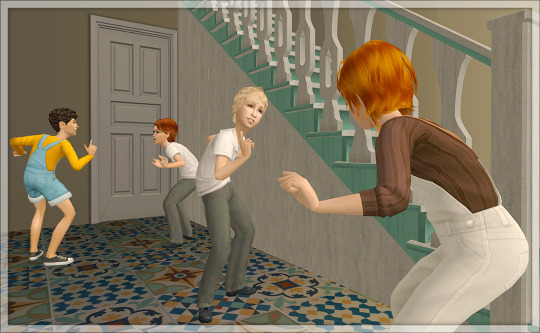
Thankfully, they're all done and dusted before the boys get home from school, bringing their friends Phineas and Annabel with them��
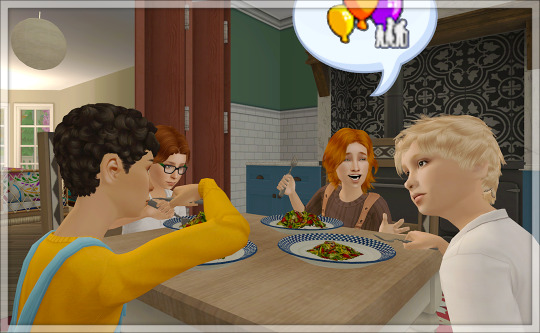
...who stay for tea. Annabel is already issuing invitations for her next birthday party, where she's planning to have all her family present, as well as her many friends.

Midge is having much less success socially.

Ouch! Although it's more hurt pride than anything. Grace the Stroppy Stray is a real terror though!
#sims 2#gameplay#merybury#bertram bennet#beth brandon#elizabeth bennet#midge bennet#phineas elton#annabel wentworth#grace the stroppy stray#bennet family
14 notes
·
View notes